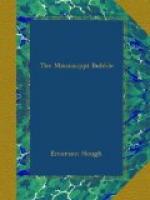Cynically mirthful or irreverently indifferent, yet never did her master’s strength forsake him, never did his heart lose its undauntedness. And when he bade Mary Connynge do this or that she obeyed him; when he bade her arise she arose; at his word she came or departed. A dozen nights in the month she was absent from the house of Knollys. A dozen nights Will Law was cozened into frenzy, alternating between a heaven of delight and a hell of despair, and ignorant of her twofold duplicity. A dozen nights John Law knew well enough where Mary Connynge was, though no one else might know. There was feminine triumph now in full in the heart of this Mary Connynge, who had gone white with rage at the sight of a rose offered across her face to another woman. Had she not her master? Was he not hers, all hers, belonging in no wise to any other?
For the future, Mary Connynge did not ponder it. An ephemera, once buried generations deep in the mire and slime of lower conditions, and now craving blindly but the sunlight of the day, she would have sought the deadly caress of life even though at that moment it had sealed her doom. Foolish or wise, she was as she was; since, under our frail society, life is as it is.
Only at night, on those nights when she was sleepless on her own couch beneath the roof of Catharine Knollys, did Mary Connynge allow herself to think. Tell, then, ye who may, whether or not she was a mere survival of some forgotten day of the forest and the glade, as she lay with her hands clasped in brief moments of emotion. Surely she hoped, as all women hope who love, that this might endure for her forever. Yet the next moment there came the thought that inevitably it all must end, and soon. Then her hand clenched, her eyes grew dry and brilliant. She said to herself: “There is no hope. He can not be saved! For this short period of his life he shall be mine, all mine! He shall not be set free! He shall not go away, to belong, at any time, in any part, to any other woman! Though he die, yet shall he love me to the end; me, Mary Connynge, and no other woman!”
Now, under this same roof of Knollys, separated by but a few yards of space, there lay another woman, thinking also of this convict behind the prison bars. But this was a woman of another and a nobler mold. Into the heart of Catharine Knollys there came no mere mad selfishness of desire, yearn though she did in every fiber of her being since that first time she felt the mastering kiss of love. There was born in her soul emotion of a higher sort. The Lady Catharine Knollys prayed, and her prayer was not that her lover should die, but that he might live; that he might be free.
Nor was this hope left to wither unnourished in the mind of the high-bred and courageous English girl. Alone, without confidant to counsel her, with no woman friend to aid her, the Lady Catharine Knollys backed her own hopes and wishes with resource and energy. There came a time, perilously late, when a faint rose showed once more in her cheek, long so worn, a faintly brighter light glowed in her deep eye.




